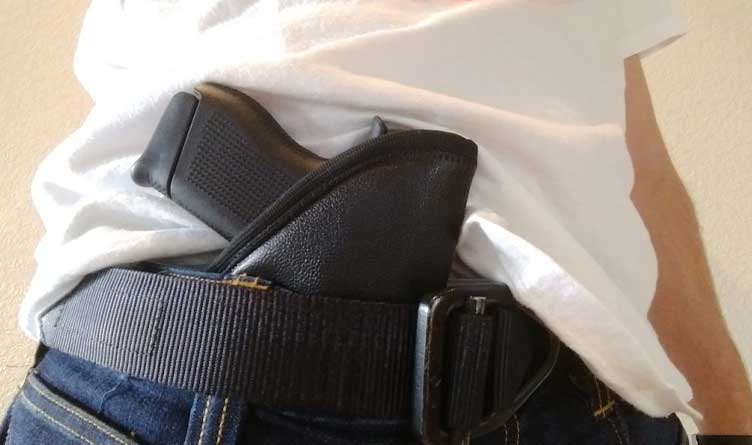Photo Credit: Clinger Holsters / CC
Published June 15, 2021
By John Harris [Tennessee Firearms Association] –
The Tennessee Legislature was able to work through a full session in 2021 without too many of the problems being attributed to Covid-19. The year had significant hopes as at least three bills were pending which addressed either permitless carry or something much more desirable and closer to real constitutional carry. TFA tracked 53 bills in 2021 of which 20 were enacted into law. Of those 20, only a few are likely of interest to most firearms owners and conservatives.
What can be said of 2021 is that it was an opportunity, as has occurred in the past, for Tennessee to enact real constitutional carry and to materially repeal or remove existing infringements on those rights as identified and protected by the 2nd Amendment. It was also a chance to put in place constitutional and 10th Amendment protections for Tennessee to guard against an out of control federal government.
While those opportunities existed within the scope of the Legislature’s options, the Legislature chose to travel paths that fell far short of what could or should have been done. In the end, Tennessee’s Legislature did not enact true constitutional carry and it did not enact real protections for Tennesseans against threatened and growing infringements by the federal government.
So what did happen? To start, consider two bills that are favorable for conservatives and gun owners.
Senate Bill 1148 / House Bill 25 (Public Chapter 387) addresses the issue of civil immunity and civil tort claims when a self-defense event has occurred. This legislation amended Tennessee Code Annotated § TCA 39-11-622. It applies when an individual has used self-defense and there is a pending or possible criminal investigation or criminal charges.
In that instance, if a related civil tort claim (e.g., wrongful death) is filed then the person who used force in self-defense has the option to ask the civil court to stay the civil proceedings if a criminal investigation on the same set of facts is pending or active. The law requires the civil court to grant the stay until the criminal investigation concludes. The criminal investigation is concluded when the potential or actual criminal charges are dismissed/retired based on the merits of the case, a no true bill is returned by the grand jury, a judge or jury returns a verdict, or when district attorney or investigating law enforcement makes clear that it will not pursue criminal charges.
*** Click Here to Support Conservative Journalism in Tennessee. We can’t bring you information about Gun Rights in Tennessee without your support!***
If a civil action is commenced based on the same set of facts as a defendant’s use or threatened use of force, the defendant may assert in any responsive pleading or by motion that he or she has immunity from the charges and that because of the defendant’s immunity, the claim does not state a cause of action upon which relief can be granted. The defendant can request a hearing to determine if the civil action should be dismissed.
In that hearing, a presumption of immunity is created if the court finds that the defendant has presented sufficient admissible evidence to fairly raise permissible use/threatened use of force and at that point the burden is on the plaintiff to show that it was not a self-defense matter. If the court ultimately finds that civil immunity applies, the court is authorized to award the defendant attorney’s fees and costs.
Senate Bill 551/ House Bill 761 (Public Chapter 592) enacted a sales tax holiday for gun safes and gun safety devices. – Tax Exemptions for Gun Safes and Gun Safety Devices. Although the bill as filed would have made this a permanent exemption, it was watered down to a one year exemption that starts July 1, 2021 and ends June 30, 2022. The tax-free holiday exempts safes and computerized locking devices from state sales taxes. The locks must inhibit the firearm’s use except by the owner, such as with biometric trigger locks.
Next, there are new laws that have been referenced by many, particularly on social media, as great for Tennessee but which are predominately form over substance and do not in fact do what they suggest that they would do. The laws fall into the category of so-called “Second Amendment Sanctuary State” laws. That category of law is intended to reference state enactments which effectively nullify or materially impede the enforcement of federal laws, orders, regulations, treaties, etc., that negatively impact or burden the rights protected by the Second Amendment. In Tennessee, consider these two new laws which suggest that form but lack that substance.
Senate Bill 557 / House Bill 446 (Public Chapter 444) has been referred to as the “Tennessee Firearm Protection Act.” The law is an apparent rewrite of a law previously passed in 2015 but which, as amended in 2015, had no enforcement teeth. The 2021 law prohibits the use of state or local funds or employees to enforce any federal law or executive order regulating the sale of firearms, ammunition, or accessories if it violates state law or the state constitution.
The law provides that if the legislature finds that the law has been violated by a state or local government entity that the legislature “may” reduce state funding to the entity involved. Given that the legislature has the inherent authority to set the budget or provide funding for any agency at almost any time, the law really does nothing more than serve as a potential warning to state or local agencies that the legislature might do something – reducing funding – that it has the power to do without this law. No real protection was created by this law.
Senate Bill 1335 / House Bill 928 (Public Chapter 553) was titled the Tennessee Second Amendment Sanctuary Act. On its face, it makes it a violation for any public official to aid in enforcing any federal law, treaty, executive order, rule, or regulation that has been found by the Tennessee Supreme Court or the United States Supreme Court to violate Article I, § 26 of the Tennessee Constitution or the Second Amendment. Such federal enactments are declared to be is null, void, and unenforceable in Tennessee.
The law does not include any express provision for an individual to bring a private enforcement action or claim for declaratory judgment seeking to have any such federal enactment challenged on constitutional grounds nor to have the actions of local or state officials challenged as being in violation of this law. Further, it only applies in the remote future contingency that either the Tennessee Supreme Court or the United States Supreme Court has already ruled that such federal enactment is unconstitutional or violates state law. Thus, there is a remote if any chance that this law will act as an effective deterrent effect on state officials or local officials who want to continue to help federal officials enforce federal laws (such as, perhaps, as a means of obtaining federal grant dollars).
Next is the law that has had substantial public news media attention for the last two years. Starting in February 2020, Governor Bill Lee announced that he was filing his own bill (he is of course not a legislator) that would implement what he referred to as “constitutional carry” in Tennessee. Some weeks later, about the time that Covid slowed things down, the details of the Governor’s bill started to be revealed.
First, it is important to know that real constitutional carry means that any person who can legally possess a firearm can carry that firearm in most places, including most public places. When the details of the Governor’s bill were finally revealed in 2020, it was clear that it was not true constitutional carry. Instead, it was just another exception to the criminal charge under Tennessee Code Annotated § 39-17-1307(a) of carrying a firearm with the intent to go armed.
So what did the Governor’s self-declared “constitutional carry” law do (Senate Bill 765 / House bill 786 and now Public Chapter 108) actually do?
It amended Tennessee Code Annotated § 39-17-1307 to add a new subpart (g). That subpart makes it an exception to a criminal charge of carrying a firearm with the intent to go armed if approximately 7 conditions are met. If those conditions are met (an officer can stop you and interrogate you on these issues based on how the law is written) then a person who does not have a civilian permit may carry a handgun, openly or concealed, as long as the handgun is lawfully possessed, and the possessor is lawfully present at a location. The person must be 21 years old, or at least 18 if the person is a member of the military on active duty (or on guard/reserve status with basic training completed). Honorably discharged members also qualify for the 18-20 year old provision.
Individuals lawfully carrying a handgun under this provision are not granted the increased protections that enhanced permit holders are “allowed”, and are still disallowed from carrying a handgun in many public and private locations such as state parks or on greenways. There are additional conditions on who can carry that are not part (or not part as incorporated into this law) of current federal law regarding who can legally purchase or possess a handgun. In addition, the bill is a multi-million dollar crime bill that either makes crimes or increases the crimes or penalties on certain firearms related crimes. Please note that TFA is preparing a more in-depth look at this law and the traps that it creates for Tennesseans which will be released shortly.
Aside from these highlighted bills, what else passed (in Senate Bill order)?
SB19/HB864 (PC 458) – regarding assaults against first responders. This law extends the definition of first responders to include a nurse but only if discharging or attempting to discharge first responder services.
SB189/HB50 (PC 83) – modifies the standards under which use of deadly force is authorized to include defense against “grave sexual abuse,” which is defined as rape, aggravated rape, rape of a child, and aggravated rape of a child.
SB277/HB153 (PC 166) – Law enforcement agencies are now authorized to exchange confiscated firearms for a broader range of items suitable for law enforcement purposes. Previously, law enforcement agencies were limited to exchanging only for other firearms, ammunition, and body armor. This bill was meant to allow agencies the discretion to obtain what is needed relative to their specific jurisdiction.
SB404/HB412 (PC 322) – Retired law enforcement and private protective services. When offering private protective services, retired law enforcement officers have options for meeting the state licensing exemption listed under the Private Protective Services Act.
SB543/HB661 (PC 195) – The Comptroller of the Treasury is no longer statutorily required to perform a yearly audit to ensure that the $15 received from each application is being used solely for that purpose. While the law still requires the extra $15 to be used for specific purposes, there is no ongoing monitoring to make sure that is what the money is used for.
SB555/HB762 (PC 433) – This law corrects typographical errors that mistakenly listed “especially aggravated rape of a child” as a crime of violence in multiple subsections; there is no such offense. The correctly listed offense is updated to “aggravated rape of a child.”
SB675/HB888 (PC 539) – This law addresses and changes which violations are/are not eligible for expunction. While it modifies the existing list of eligible violations, it also increases the amount of time required to have passed based on the severity of the offense. Class A and Class B felonies are not eligible. Possession of a firearm by an individual convicted of a felony drug violation is not eligible for expunction.
SB747/HB79 (PC 403) This law authorizes judges or administrative officers overseeing rule-violation hearings to order the state to pay certain expenses to the respondent when a state regulatory agency issues a notice of violation for frivolous or unsupported violations, or if the notice was intended to harass, delay, or cause needless expense. Also authorizes a reviewing court or agency to sanction a license holder seeking review of a state-agency decision (if appropriate).
SB896/HB1186 (PC 420) – Amends various aspects of Tennessee trust law (potential impact on NFA and other firearms related trusts)
SB1142/HB1171 (PC 540) – Firearms Information Privacy Protection Act. This law allows an individual to pursue a civil action against a person who unlawfully obtains information that identifies the individual as an owner of firearms, ammunition, or accessories if the violator discloses that information for the purposes of creating or contributing to a confiscation effort or registry. If the discloser is acting in their official capacity as an employee of the state or local government, or if the information was obtained in that capacity, the violator commits a Class E Felony.
SB1334/HB902 (PC 554) – Second Amendment Privacy and Protection Act. This law creates a Class E felony for any government official or employee to create or maintain any registry meant to record the private possession of firearms or accessories. Does not apply to current lawful records, such as agency armory logs or evidence logs. An individual adversely affected by any enactment that violates this provision may pursue a civil action and be granted relief and damages as appropriate.
SB1380/HB1406 (PC 489) – Law Enforcement Officer Use of Force. This law bans no-knock warrants. Law enforcement officers are disallowed from applying a chokehold as a method of restraint against resisting suspects unless the officer reasonably believes that lethal force is authorized. Law enforcement agencies must develop and implement a de-escalation curriculum. Creates an immediate duty to intervene, and also a duty to report any excessive use of force, regardless of whether an officer witnessed the excessive use of force directly. Officers can no longer discharge their weapons at or from moving vehicles unless the officer reasonably believes that deadly force is authorized. Mandates the creation of a use of force reporting system.
SB1608/HB159 (PC 516) – Personal Privacy Protection Act. 501(c) tax-exempt agencies are no longer required to provide the names or other personal information of individuals who have provided financial or nonfinancial support to any public agencies. Agencies may share personal information with federal agencies in accord with federal laws. Does not apply to lawfully disclosed information, such as personal information provided to or between law enforcement agencies, warrants for personal information, or other lawful disclosures made during audits, investigations, or background checks. This law also does not apply to higher-education institutions.
SB109/HB1096 (PC 188) – Discipline in School / Teacher Immunity. This law grants civil immunity to any teacher, principal, school employee, or school bus driver who uses reasonable force to correct or restrain a student, or who uses reasonable force to prevent the bodily harm or death of another person. Previously, such authorized individuals were permitted to use reasonable force in the same circumstances, but no provision expressly granted civil immunity for injuries sustained from a reasonable use of force. Civil immunity does not apply when the actor was grossly negligent or reckless, or when their actions amounted to intentional misconduct. This civil immunity does not apply to the administration of corporal punishment. A student may still receive an examination within 48 hours under TCA 49-6-4404 to determine if the imposition of corporal punishment was excessive. Students with a disability (students with an individualized education plan under TCA 49-6-4103) are not to be restrained or isolated for corrective purposes under this section, but the use of reasonable force against such students to prevent harm to others qualifies for civil immunity.







